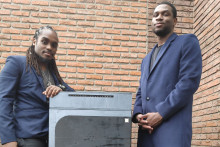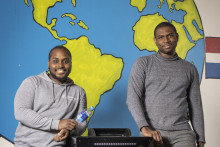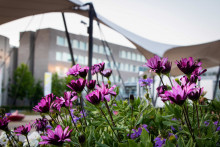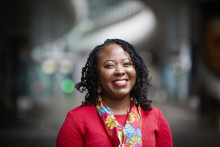The prototype of Plaex was meant to be showcased at the University of Twente today as part of the Sustainability Week. The event had to be cancelled due to the new corona restrictions, but the company is ready to take its next steps either way. ‘Insufficient recycling really bothers me to the core,’ says Tyrell Pantophlet (CEO), who studied Advanced Technology at the UT. He runs Plaex together with Psychology graduate Victor Okoro (CSO) and Jorge Allerano (CTO).
What gave you the idea to create a smart recycling bin?
Tyrell: ‘I met Victor through a Tosti Talk I gave about recycling. We exchanged ideas, knowing we wanted to make something with real impact. Initially we had other ideas, but by talking to companies we found out that a smart recycling bin would be the most interesting for them.’
Victor: ‘We have something special going. Automatic recycling has environmental benefits, because it creates cleaner waste streams that can be recycled and doesn’t end up burning or at landfills. It also saves our clients money on residual waste costs.’
How exactly does the bin work?
Tyrell: ‘We cannot go into detail, because we are trying to patent our technology, but in essence the bin uses AI made by us, combined with object detection and other tools. It is able to identify the trash and place it into the correct compartment inside the bin. It is based on machine learning, and so the system gets better the more it’s used.’
Victor: ‘Our current prototype is based on the Dutch waste stream, so it has four bins inside: for PMD, paper, organic and residual waste. But we can scale this up or down depending on the client’s needs, because waste separation works differently in every country. We made it so it can be deployed anywhere in the world.’
Why do we need an automatic recycling bin? Why not educate the public on waste separation, for example?
Victor: ‘You may indeed ask: why not just throw everything in one bin and separate afterwards? That is not possible because of cross contamination. The materials come in contact and get damaged, making it impossible to recycle them. Why not educate people? Even if you are interested in waste separation, everyone cannot know every type of waste. Even the most educated person will make mistakes and that will inevitably lead to cross contamination. At that point cleaning and recycling of the materials becomes too expensive for companies and the waste gets burned.’
What are the next steps for Plaex?
Tyrell: ‘We aim to do pilot tests with various companies to improve the product and then enter the market with a perfectly functioning bin.’
Victor: ‘We want to make big steps in recycling and creating less waste, and we do not intend to do this in the Netherlands alone. Our team is what makes us special. We are three founders and three associates so far, all from different countries - super international, and all really passionate about our goal of “being part of the change to a sustainable future”.’
Why enter this field in the first place? What motivated you?
Tyrell: ‘I was born in Saint Maarten, where we have a lot of problems with sustainability. There are landfills that are constantly burning, which I really hated. That motivated me to move to the Netherlands and focus on sustainability. I want to do something that really helps my country and the rest of the world. I want to create positive change, so that future generations don’t have to experience this.’
Victor: ‘Before I joined this start-up, I wasn’t really conscious of waste separation. I started to learn more about the impact it had on the world and realized I was quite ignorant, and so are a lot of people. I saw something could be done and asked: do I want to be part of the problem or part of the solution? Obviously, the latter.’







